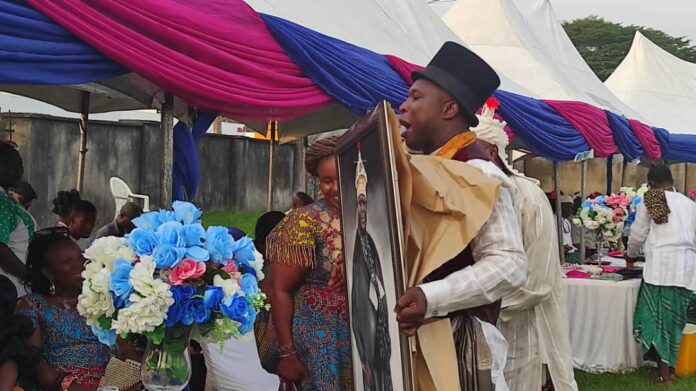ETYMOLOGY OF SELECTED EFIK WORDS
© Holyns Hogan, 2024
Dear consistent readers and followers of this globally reputed cum widely accepted Efik authorized frontline media advocate, instructor, defender and globalizer page, I am certain that you are so far adequately informed and satisfied by recorded progress. Recall that we started years back and eventually succeeded amidst criticisms to learnedly register in modern history that EFIK EDI EFIK, IDIHE MBAKARA. Recall also that this current 2024 “Learn Efik Series” has so far taught the origins and meanings of some original Efik words as Mbarakpa; Esukwa; Ofiori Ndọ; Ekwado and have, in so doing, debunked every ignorant claim and/or unguided criticisms trailing them in history.
Today, we refer to subject and continue as treated below.
1. MKPOTO (Otherwise pronounced by Efik ancestors and elders as ÑKPOTO) .
This is the Efik word for native DAIS or traditionally decorated elevated platform that gives prominence to its users or things placed on it. It mainly classifies as and includes mkpoto ubọñ (covering that for Efik royals, chieftaincy events and that used to mark part of a dead king’s rites of passage); mkpoto ndọ (Efik marriage dais); mkpoto ibọk (juju dais); mkpoto ekpe (Ekpe dais); mkpoto idem (the gods/goddesses dais); mkpoto efe mbre (theatre stage) and mkpoto efe obio (town hall stage). Mkpoto equally means romanticism or grandeur associated with pride and elegance in taste, fashion or art (Hogan, 2011; 2015, 2022; 2024; Aye, 1991).
Etymologically, the origin of MKPOTO traces to the corruption of the Efik’s MKPỌ UTO (thing of pride; honour and/or deserved glory/praises for accomplishments etc). Note that mkpọ/ñkpọ specifically means a thing/something; while uto as used, contextually infers deserved honour, praises and/or fame for good deed or exceptionally outstanding virtues or performance (Hogan, 2024).
2. EKPETERE, ETERE AND UTERE
Etymologically, these three distinct yet closely related Efik words appear to share origins as either coined, compounded or cocktailed nouns.
Precisely EKPETERE (used figuratively by late Chief Inyang Nta Henshaw to infer the ancestors and/or unsacred/non-Ndem spirits in the song- “Ekot Ekpetere edi tiene Ndem adia ñkpọ mbono/eset edia ke otu”) is Efik other name for Ntafiọñ (black wasp with offensive odour, mostly found in the forest/ superstitiously believed at some quarters to have spiritual implication as the symbolic announcer of ghost presence in an area), comes from the corruption of marriage between Ekpe (figuratively used here to giant, master or king) and ETERE/UDUỌÑỌ OKPO (Efik name for a public burial/dumping ground for mainly evil corpses, usually cited in a far-off forest, ravens or public wastes dumping areas).
UTERE is Efik name for vulture and is naturally related to Ekpetere and Etere because they not only have TERE surname/surfix similitude but figuratively symbolize evil, filt or “unclean” existence.
3. BRAÑKINISỌÑ
This is the Efik word for Carpet. It directly translates to floor blanket or something used to cover/decorate the ground in office, homes, events centres or worship places (Hogan, 2023; Aye, 1991). The word naturally comes from the corruption of marriage between BRAÑKIN (Efik corrupt word for blanket) and ISỌÑ (Efik homonym for floor, ground and down).
4. UTUENE IKAÑ/UTUEN’IKAÑ
This Efik word for hurricane bush lamp/lantern, translated directly to light shinner, etymologically comes from UTUENE (adj.formed from/by adding “U” to/ retated to TUENE (the Efik verb/word for “to shine” the light or illuminate a specified area or spot with torch or latern light) and IKAÑ (Efik word for light, gun or fire).
EDITORIAL
All rights of copy are@ Holyns HOGAN, 2024. No part of this already published work should be copied, shared, stored, used or advertised without the author’s written consent and approval.









